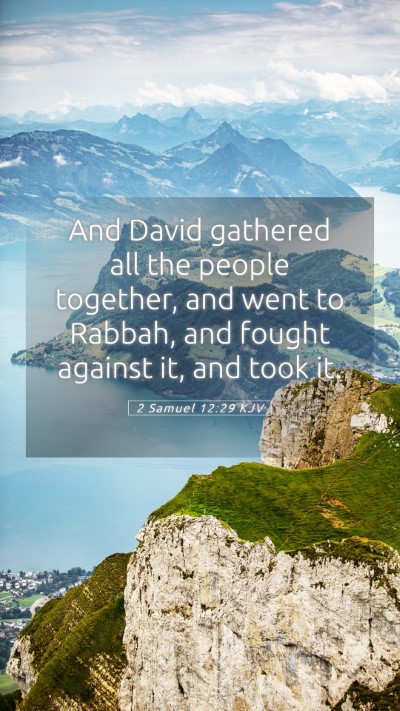Understanding 2 Samuel 12:29
In this verse, we observe King David taking decisive action in response to the aftermath of his sins, particularly regarding the situation with Uriah and Bathsheba. The verse reads: "And David gathered all the people together, and went to Rabbah, and fought against it, and took it." Below, we will explore the meaning of this verse, to provide insights into its significance using various public domain commentaries.
Bible Verse Meaning
The verse illustrates a turning point for David. Following his sin with Bathsheba — which included adultery and orchestrating Uriah's death — David faced the consequences of his actions. This scripture represents his commitment to reclaiming his kingdom and honor by engaging in warfare against Rabbah, the capital of the Ammonites.
David's Leadership
According to Matthew Henry, this act signifies David's return to his responsibilities as king. It showcases his desire to lead from the front, rallying his troops and engaging in battle rather than shirking his duties. Henry emphasizes that David's earlier moral failures did not disqualify him from fulfilling his role as a leader.
God's Mercy and Justice
Albert Barnes expands on the idea of divine judgment and mercy in this context. Though David faced dire consequences for his sin, including the death of his child, he was not abandoned by God. Barnes notes that God often provides a means of grace, allowing David to seek restoration through his leadership and actions as he rallies the people.
The Significance of the Battle
Adam Clarke discusses the historical significance of Rabbah, highlighting it as a symbol of God's judgment against the enemies of Israel. The battle at Rabbah is not just a military endeavor; it represents a divine purpose and the reclaiming of territory that was rightfully Israel's. Clarke explains that taking Rabbah was a critical step in solidifying David's reign and aligning with God's plan for Israel.
Related Bible Cross References
- 2 Samuel 11:15-17 - The account of Uriah’s death and David’s sin.
- 1 Chronicles 20:1-3 - Parallel account of David fighting against Rabbah.
- 2 Samuel 12:1-14 - Nathan’s confrontation with David regarding his sin.
- Psalm 51 - David’s penitential psalm after his sin with Bathsheba.
- 2 Samuel 7:12-16 - God’s covenant with David concerning his dynasty.
Bible Verse Interpretations
The interpretations of 2 Samuel 12:29 resonate with various theological themes:
- Leadership Responsibilities: David's actions highlight the weight of leadership and accountability before God.
- Divine Forgiveness: David engages in battle, reflecting his desire for redemption and restoration.
- Restoration of Honor: The conquest of Rabbah speaks to David's reclaiming of his position and moral standing as king, emphasizing the importance of repentance and action.
Applying 2 Samuel 12:29 to Daily Life
This verse serves as a reminder for modern individuals about the implications of leadership and the call to action following moral failure. Here are insights on how to apply this passage:
- Recognize Accountability: Understand the importance of facing the consequences of one’s actions without retreating.
- Seek Restoration: Just as David returned to battle, we should pursue avenues for forgiveness and restoration in our lives.
- Lead by Example: Emulate David’s willingness to lead and inspire those around us towards positive action.
Conclusion
In conclusion, 2 Samuel 12:29 encapsulates the profound themes of leadership, accountability, and the desire for redemption. It invites readers to reflect on the complexity of human actions and God's grace, inspiring individuals to seek righteousness and restoration within their lives. As we engage in Bible study and explore the meanings of such verses, we gain deeper insights into Scripture that can guide our daily decisions and foster spiritual growth.
As we continue our Bible study journey, we encourage you to use tools and resources to delve deeper into the meanings of Bible verses, exploring commentaries and cross-references that enhance understanding.


